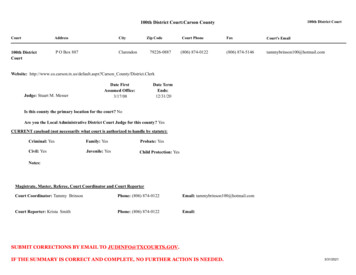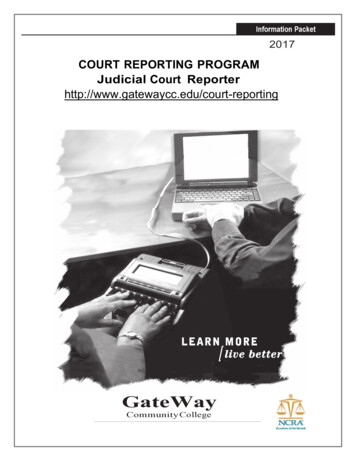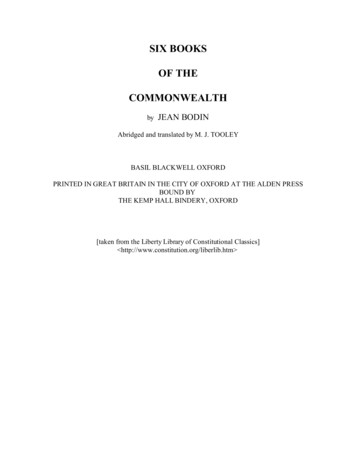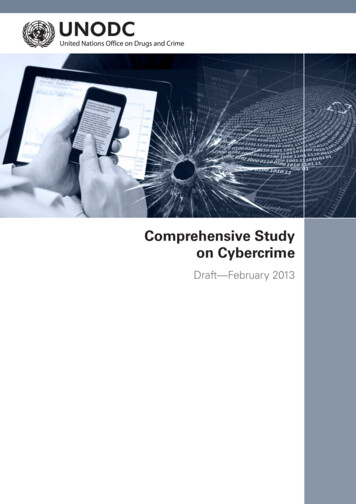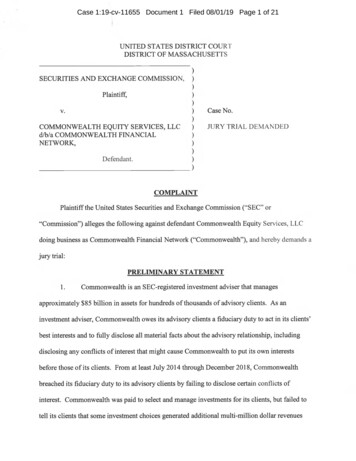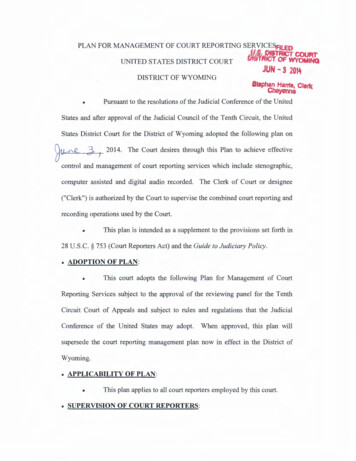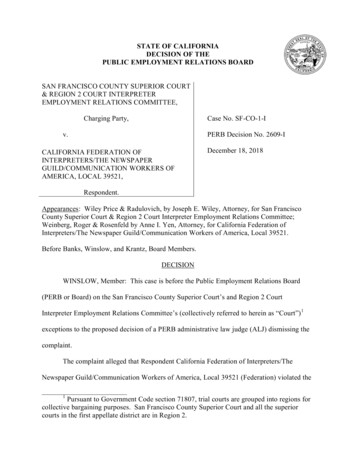
Transcription
IN THE COMMONWEALTH COURT OF PENNSYLVANIAOnline Merchants Guild,Petitionerv.C. Daniel Hassell, in his officialcapacity as Secretary of Revenue,Department of Revenue,RespondentBEFORE::::: No. 179 M.D. 2021::::: Argued: June 22, 2022HONORABLE RENÉE COHN JUBELIRER, President JudgeHONORABLE PATRICIA A. McCULLOUGH, JudgeHONORABLE ANNE E. COVEY, JudgeHONORABLE MICHAEL H. WOJCIK, JudgeHONORABLE CHRISTINE FIZZANO CANNON, JudgeHONORABLE ELLEN CEISLER, JudgeHONORABLE LORI A. DUMAS, JudgeOPINIONBY JUDGE CEISLERFILED: September 9, 2022Before this Court are cross-applications for summary relief filed by C. DanielHassell, the Secretary of Revenue (Revenue), and the Online Merchants Guild(Guild), a trade association comprised of online businesses that sell merchandisethrough Amazon’s Fulfillment by Amazon (FBA) Program.1 The key issue beforethis Court is whether non-Pennsylvania businesses that sell merchandise throughAmazon’s FBA Program must collect and remit Pennsylvania sales tax pursuant toAs described on Amazon’s website, the FBA Program is an Amazon service throughwhich “businesses outsource order fulfillment to Amazon. Businesses send products to Amazonfulfillment centers and[,] when a customer makes a purchase, [Amazon will] pick, pack, and shipthe order. [Amazon] can also provide customer service and process returns for those orders.” d seussoagoog-sitelink-fba2-D (last visitedSeptember 8, 2022).1
Section 237(b)(1) of the Tax Reform Code of 1971 (Tax Code),2 which provides that“[e]very person maintaining a place of business” in the Commonwealth ofPennsylvania (Commonwealth) must collect and remit Pennsylvania sales tax, orpay personal income tax (PIT) pursuant to Section 302(b) of the Tax Code,3 whichimposes PIT at a rate of 3.75 % upon nonresidents for income derived “from sourceswithin this Commonwealth.”After careful review, we hold that Revenue has failed to provide sufficientevidence that non-Pennsylvania businesses selling merchandise through the FBAProgram (FBA Merchants), and whose connections to the Commonwealth were onlyshown to be limited to the storage of merchandise by Amazon in one of Amazon’sPennsylvania warehouses, have sufficient contacts with the Commonwealth suchthat Revenue can mandate they collect and remit sales tax or pay PIT pursuant toSections 237(b)(1) and 302(b) of the Tax Code. Accordingly, we grant the Guild’scross-application for summary relief and deny the cross-application for summaryrelief filed by Revenue.I. BackgroundBefore engaging in a recitation of the relevant facts in this matter, it is helpfulto first review the legal precedent governing when a state may exercise jurisdictionover a nonresident business, as well as the pertinent provisions of the Tax Code.A. Case LawWhether a person or entity may be liable for taxes revolves around the wellestablished notion that the potentially liable party must have “minimum contacts”with the forum jurisdiction. Wirth v. Commonwealth, 95 A.3d 822 (Pa. 2014). In2Act of March 4, 1971, P.L. 6, as amended, 72 P.S. § 7237(b)(1).3Added by the Act of August 4, 1991, P.L. 97, 72 P.S. § 7302(b).2
Quill Corporation, Inc. v. North Dakota, 504 U.S. 298 (1992), the United States(U.S.) Supreme Court reviewed whether a North Dakota taxing statuteimpermissibly required an out-of-state mail-order business, which had neither retailoutlets nor sales representatives in North Dakota, to collect and remit North Dakota’suse tax, in violation of Section 1 of the Fourteenth Amendment of the U.S.Constitution (Due Process Clause)4 and Article I, Section 8, Clause 3 of the U.S.Constitution (Commerce Clause).5 Quill Corporation, Inc. (Quill), a purveyor ofoffice equipment and supplies, solicited business to North Dakota residents throughcatalogs and flyers, magazine advertisements, and telephone calls. Id. at 302. TheNorth Dakota taxing statute required any retailer, defined as any person engaging inregular or systematic solicitation of a consumer market in the state, to collect a “usetax” for any property purchased for storage, use, or consumption within the state.Id. In analyzing the constitutionality of the use tax, as applied to Quill, the U.S.Supreme Court noted that the Due Process Clause and Commerce Clause reflecteddifferent constitutional concerns, and a taxing statute that comported with dueprocess may nonetheless violate the Commerce Clause. Id. at 305-06. A due processanalysis typically encompassed the concepts of notice and fair warning and lookedto “the fundamental fairness of government activity” and whether a state’s exerciseof power over a nonresident was legitimized by the nonresident’s connections to thatstate. Id. at 312. A Commerce Clause analysis, conversely, was “informed . . . bystructural concerns about the effects of state regulation on the national economy.”The Due Process Clause relevantly provides that no state shall “deprive any person oflife, liberty, or property, without due process of law[.]” U.S. Const. amend. XIV, § 1.4The Commerce Clause provides that “[t]he Congress shall have Power . . . [t]o regulateCommerce with foreign [n]ations, and among the several States, and with the Indian Tribes.” U.S.Const. art. I § 8, cl. 3.53
Id. A tax would sustain against a Commerce Clause challenge where it: (1) appliedto an activity with a substantial nexus to a taxing state; (2) was fairly apportioned;(3) did not discriminate against interstate commerce; and (4) was fairly related to theservices provided by the state. Id. at 311 (citing Complete Auto Transit, Inc. v.Brady, 430 U.S. 274, 279 (1992)).As to Quill’s activities in North Dakota, the U.S. Supreme Court held thatQuill “purposely directed its activities at North Dakota residents [and] the magnitudeof those contacts” was sufficient to withstand a due process challenge. Id. at 308.Regarding the Commerce Clause, however, the U.S. Supreme Court reaffirmed itsprior determination in National Bellas Hess, Inc. v. Department of Revenue ofIllinois, 386 U.S. 753 (1967) (overruled by South Dakota v. Wayfair, Inc., 138 S. Ct.2080 (2018)), that an out-of-state vendor whose only contacts with the taxing statewere by mail or common carrier lacked the substantial nexus required. Quill, 504U.S. at 317. Accordingly, as Quill did not have a physical presence in North Dakota,the Commerce Clause shielded it from collecting and remitting the North Dakotause tax. Id. at 302.In 2018, after recognizing changes in the marketplace brought about byinternet sales, the U.S. Supreme Court explicitly overruled Quill in Wayfair, whichconcerned a South Dakota act that required out-of-state sellers to collect and remitsales tax “as if” they had a physical presence in the state. Relying on Quill, the SouthDakota Supreme Court had affirmed a lower court decision invaliding the act, whichapplied to sellers delivering more than 100,000 in goods or services, or engagingin more than 200 transactions for the sale of goods or services, into the state. 138 S.Ct. at 2089. The U.S. Supreme Court rejected the physical presence requirement inQuill as unsound, given that a business with a single salesperson located in a4
particular state would be required to collect and remit sales tax but a business withidentical sales and a website accessible in every state would not. Id. at 2093. TheU.S. Supreme Court noted that the Commerce Clause was designed to prevent statesfrom engaging in economic discrimination, not to relieve those engaged in interstatecommerce from their share of a state’s tax burden. Id. at 2093-94. Quill underminedthese precepts, as it put local, and many interstate businesses, at a competitivedisadvantage relative to remote sellers. Id. at 2094. In the absence of Quill’sphysical presence requirement, the U.S. Supreme Court turned to the first prong ofthe test identified in Complete Auto, which simply asked whether a tax applied to anactivity with a substantial nexus to the taxing authority. Id. at 2099. The SouthDakota act only applied to those out-of-state sellers delivering more than 100,000in goods or services or engaging in 200 or more separate transactions deliveringgoods and services, a quantity of business that the U.S. Supreme Court felt “couldnot have occurred unless the seller availed itself of the substantial privilege ofcarrying on business in South Dakota.” Id. As the Wayfair respondents were largenational companies with an extensive presence, the substantial nexus requirement inComplete Auto was satisfied. Id.6While Pennsylvania courts have not yet addressed the narrow issue of whethera nonresident business that stores merchandise in a Pennsylvania warehouse issubject to the sales tax and PIT provisions of the Tax Code, they have reviewedwhether due process is implicated by the imposition of taxes on nonresidents. InEquitable Life Assurance Society of the United States v. Murphy, 621 A.2d 1078 (Pa.Cmwlth. 1993), this Court relevantly addressed whether a realty transfer tax imposed6Because other principles that might invalidate the South Dakota act had not been litigated,the U.S. Supreme Court vacated the judgment of the South Dakota Supreme Court and remandedthe matter for further proceedings. Wayfair, 138 S. Ct. at 2100.5
by the City of Philadelphia (City) on the sale of a nonresident’s real property violatedthe Due Process and Commerce Clauses of the U.S. Constitution. We recognizedthat the “minimal connection between” the taxing authority and the person it soughtto tax required that the taxes imposed bear a rational relationship “to the protections,opportunities[,] and benefits given by the taxing authority.” Id. at 1091 (internalcitations omitted). “The simple but controlling question” concerned whether thetaxing authority had “given anything for which it [could] ask [in] return.” Id.(emphasis in original). Although the settlement disposing of the real property tookplace out of state, the real property itself was located in the City, which created theconnection required to withstand a claim under the Due Process Clause. Id. at 1092.The realty transfer tax also survived the appellants’ Commerce Clause challenge, asit satisfied the test outlined in Complete Auto. Id. at 1093. The realty transfer taxhad a substantial nexus with the City, as it only applied to transfers of real propertylocated within the City’s jurisdiction. Id. at 1093. The tax was fairly apportioned,which meant that it could not be imposed a second time by another jurisdiction andthat it “reasonably reflect[ed] the in-state component of the activity being taxed[,]”because only the City, and no other locality, could tax sales of real estate locatedwithin its borders, and the only portion of the transaction subject to taxation was thatwhich involved the transfer of City real estate.Id.The tax was deemednondiscriminatory, as it applied at the same rate to both residents and nonresidents.Id. Finally, the tax was fairly related to the municipal services provided by the Cityto owners of real property located therein. Id. at 1093-94.In Marshall v. Commonwealth, 41 A.3d 67 (Pa. Cmwlth. 2012), this Courtupheld Revenue’s imposition of PIT on Robert Marshall (Marshall), a nonresidentpartner of a Connecticut limited partnership (Partnership) that owned the U.S. Steel6
Tower, a 64-story office building, and the underlying parcel of land, located inPittsburgh, Pennsylvania.Marshall challenged the PIT on several grounds,including due process, arguing that he lacked minimum contacts with theCommonwealth.7 Id. at 73. This Court rejected Marshall’s due process argument,as the Partnership’s primary purpose was ownership and maintenance of the U.S.Steel Tower. Id. at 74. Marshall “purposefully availed himself of the opportunityto invest in Pennsylvania real estate through [the Partnership,]” which providedsufficient minimum contacts for the imposition of PIT after the Partnership disposedof the property. Id.Our Supreme Court reached the same conclusion in Wirth, which consolidatedan appeal from our decision in Marshall with appeals filed by other nonresidentpartners of the Partnership. The Supreme Court noted that the analysis of theappellants’ due process claims, and whether they could be liable for PIT, consideredwhether they had minimum contacts with Pennsylvania. Id. at 837. Whetherminimum contacts existed turned on whether the appellants could “reasonablyanticipate being taxed upon a taxable event.” Id. The Supreme Court agreed withRevenue that the primary purpose of the Partnership was “to own, operate, and gainincome from” the U.S. Steel Tower. Id. at 839. As a result, through the Partnership’sownership and operation of the U.S. Steel Tower, the appellants “purposefullyavailed themselves” of Pennsylvania law, thus establishing minimum contactswithin Pennsylvania. Id.B. The Tax CodeSection 202(a) of the Tax Code, 72 P.S. § 7202(a), imposes a six percent tax“upon each separate sale at retail of tangible personal property or services[.]”Because Marshall failed to properly develop his argument that Revenue’s action violatedthe Commerce Clause, we deemed the issue waived. Marshall, 41 A.3d at 73.77
Pursuant to Section 237(b)(1) of the Tax Code, 72 P.S. § 7237(b)(1), Pennsylvaniasales tax must be collected and remitted by “[e]very person maintaining a place ofbusiness” in the Commonwealth.8 Further, any person that is required to collectPennsylvania sales tax from another person, and that fails to do so, shall be liable forthe full amount of the tax that should have been collected.The Department of Revenue (Department), or its agents, is authorized bySection 272 of the Tax Code to “examine the books, papers[,] and records of anytaxpayer in order to verify the accuracy and completeness of any return made or, ifno return was made, to ascertain and assess the tax imposed by [the Tax Code].” 72P.S. § 7272 (emphasis added). “Taxpayer” is defined in Section 201(n) of the TaxCode, 72 P.S. § 7201(n), as “[a]ny person required to pay or collect the tax imposedby [the Tax Code.]” Section 272 further provides that the Department may “examineany person, under oath, concerning taxable sales or use by any taxpayer orconcerning any other matter relating to the enforcement or administration of [theTax Code], and to this end may compel the production of books, papers[,] andrecords and the attendance of all persons whether as parties or witnesses whom itbelieves to have knowledge of such matters. The procedure for such hearings orexaminations shall be the same as that provided by The Fiscal Code [9] relating toinquisitorial powers of fiscal officers.” Id. The relevant provision of The FiscalCode, Section 1602(a), grants the Secretary of Revenue, for the purpose ofdetermining the amount of taxes owed, and the collection thereof, authority toexamine a taxpayer’s records and to compel the production of records and the“Person” includes “[a]ny natural person, association, fiduciary, partnership,corporation[,] or other entity[.]” Section 201(e) of the Tax Code, 72 P.S. § 7201(e).89Act of April 9, 1929, P.L. 343, as amended, 72 P.S. §§ 1-1805.8
attendance of any person, whether a party or witness, deemed necessary for theinvestigation and examination of “any public account[.]” 72 P.S. § 1602(a). Shoulda person neglect or refuse to produce the records requested by the Secretary ofRevenue, Section 1602(c) of The Fiscal Code, 72 P.S. § 1602(c), authorizes theissuance of a summons “directed to the sheriff of the county in which the person”resides to procure the records.“Maintaining a place of business in this Commonwealth” is defined, inrelevant part, as follows:(1) Having, maintaining or using within thisCommonwealth, either directly or through a subsidiary,representative or an agent, an office, distribution house,sales house, warehouse, service enterprise or other placeof business; or any agent of general or restricted authority,or representative, irrespective of whether the place ofbusiness, representative or agent is located here,permanently or temporarily, or whether the person orsubsidiary maintaining the place of business,representative or agent is authorized to do business withinthis Commonwealth.(2) Engaging in any activity as a business within thisCommonwealth by any person, either directly orthrough a subsidiary, representative or an agent, inconnection with the lease, sale or delivery of tangiblepersonal property or the performance of services thereonfor use, storage or consumption or in connection with thesale or delivery for use of the services described insubclauses (11) through (18) of clause (k) of this section,including, but not limited to, having, maintaining orusing any office, distribution house, sales house,warehouse or other place of business, any stock of goodsor any solicitor, canvasser, salesman, representative oragent under its authority, at its direction or with itspermission, regardless of whether the person or subsidiaryis authorized to do business in this Commonwealth.9
(3.5)(i) Engaging in any activity as a business by anyperson, either directly or through a subsidiary,representative or an agent, in connection with the lease,sale or delivery of tangible personal property into thisCommonwealth or the performance of services for use,storage[,] or consumption[,] or in connection with the saleor delivery for use in this Commonwealth of at least[ 100,000] during the preceding twelve-month calendarperiod.[10]72 P.S. § 7201(b) (emphasis added).Section 201 of the Tax Code contains several terms that are specificallygermane to Internet sales,11 as follows:(hhh) “Forum.” A place where sales at retail occur,whether physical or electronic. The term includes a store,a booth, an Internet website, a catalog[,] or similar place.(iii) “Marketplace facilitator.” A person that facilitates thesale at retail of tangible personal property. For purposesof this article, a person facilitates a sale at retail if theperson or an affiliated person:(1) lists or advertises tangible personal property forsale at retail in any forum; and(2) either directly or indirectly through agreementsor arrangements with third parties, collects thepayment from the purchaser and transmits thepayment to the person selling the property.The term includes a person that may also be a vendor.(jjj) “Marketplace seller.” A person that has an agreementwith a marketplace facilitator to facilitates sales for thatperson.10Section 201(b)(3.5)(i) of the Tax Code was added by the Act of June 28, 2019, P.L. 50,No. 13 (Act 13), 72 P.S. § 7201(b)(3.5)(i).11Added by Section 1 of Act 13.10
72 P.S. § 7201(hhh), (iii), and (jjj).Section 237(b.1) of the Tax Code provides that a marketplace facilitatormaintaining a place of business in the Commonwealth must collect and remitPennsylvania sales tax on all sales, leases, and deliveries of tangible personalproperty by marketplace sellers whose sales are facilitated through the marketplacefacilitator’s forum.12C. Factual BackgroundTurning to the instant matter, in an agreement executed between Amazon andRevenue on January 30, 2012 (2012 Agreement), Amazon agreed to voluntarilycollect and remit Pennsylvania sales tax on its internet sales. Deposition of KevinMilligan,13 3/23/22, at 63; Guild’s Br., Ex. 4. The 2012 Agreement focused on thecollection of sales tax for goods owned and sold by Amazon. Milligan dep. at 71.In 2017, Revenue began developing a strategy for collecting sales tax from FBAMerchants that had a physical presence in the Commonwealth. Id. at 80-82. Thisstrategy coincided with the enactment of the Act of October 30, 2017, P.L. 672 (No.43), which added provisions to the Tax Code addressing the collection of sales taxfor online sales. Id. at 126, 145. Shortly thereafter, Amazon and Revenue enteredinto a second agreement whereby, effective April 1, 2018, Amazon would collectand remit Pennsylvania sales tax on FBA sales (2018 Agreement). Id. at 157. The2018 Agreement also provided that Amazon would not be liable for any sales tax1272 P.S. § 7237(b.1).Milligan is the special advisor to Revenue’s deputy secretary of taxation. Milligan dep.,3/23/22, at 9.1311
owed for FBA sales made prior to April 1, 2018.14 Id. at 161, 171. FBA Merchants,who were not parties to the 2018 Agreement, remained obligated to pay anyoutstanding sales tax for pre-April 1, 2018 FBA sales and for any FBA sales madeafter that date “if Amazon messed up” and failed to collect sales tax. Id. at 207.On June 2, 2021, the Guild filed a petition for review (PFR) with this Courtafter its members received a Business Activities Questionnaire Request (BusinessActivities Request)15 from Revenue indicating that they “may have” a physicalpresence in Pennsylvania that would require the collection and remittance ofPennsylvania sales tax and the payment of PIT. Stipulation ¶ 1(a). The BusinessActivities Request noted that, under the Tax Code, storing property, includinginventory, at a distribution or fulfillment center, or at any other location withinPennsylvania, constituted a physical presence that created tax obligations, such asincome and sales tax, that must be reported and remitted as of the date the propertywas first located within Pennsylvania. Emergency Relief Application, Ex. 1.14During this same time period, the Commonwealth Department of Community andEconomic Development issued its response to a request for proposal (RFP) issued by Amazon forthe location of a second Amazon headquarters, offering Amazon up to 4.6 billion in financialassistance should it choose Pennsylvania as the site for its new pdf (last viewed September 8, 2022). On November 13, 2018, Amazon selected New York City,New York, and Arlington, Virginia, as the destinations for its new headquarters. dquarters/1273275002/ (last viewed September 8, 2022). Amazon later hq2-queens.html (last viewed September8, 2022).The declaration of Suzanne Tarlini, Director of Revenue’s Bureau of Registration andTaxpayer Management, indicates that, as of March 23, 2021, Revenue mailed 11,263 BusinessActivities Requests to nonresident businesses believed to have a nexus with the Commonwealth.Guild’s Br., Ex. 7; Revenue’s Br., Ex. G.1512
Recipients of the Business Activities Request were offered the opportunity toparticipate in a voluntary compliance program (Compliance Program) that wouldassist them in complying with any past due tax obligations and that offered a limitedlookback period that would relieve them of tax obligations accruing prior to January1, 2019. Id. Businesses interested in participating were directed to complete andreturn a questionnaire to Revenue within 15 days of the Business ActivitiesRequest’s date, which Revenue would thereafter review for purposes of determiningthe businesses’ tax obligations. Id. Businesses deemed subject to Pennsylvania salesand income tax would be registered as such and notified of their tax collection andfiling obligations. Id. The Business Activities Request further indicated that“[f]ailure to provide the information requested [would] result in additionalenforcement actions and the business [would] forfeit any penalty relief or limitedlookback provisions provided by the [Compliance Program].” Id. (emphasis added).On June 3, 2021, the Guild filed an application for emergency relief, seekinga stay of Revenue’s June 8, 2021 deadline for complying with the Business ActivitiesRequest.Then-President Judge Brobson denied the application as moot afterRevenue agreed to extend the deadline to June 22, 2021.16 Following a June 9, 2021status conference, the parties agreed to file cross-applications for summary relief,along with supporting briefs. Revenue’s compliance deadline was extended pendingthis Court’s disposition of their cross-applications for summary relief. June 30, 2021Stipulation, ¶ 5.Prior to initiating the instant action, on February 26, 2021, the Guild filed acomplaint for declaratory and injunctive relief with the United States District Courtfor the Middle District of Pennsylvania (District Court), arguing that Revenue’s16The June 8, 2021 extension was itself an extension of the original May 8, 2021 deadlineagreed to by the parties. Emergency Relief Application, Ex. 5.13
attempts to collect Pennsylvania sales tax from the Guild’s members violated theirconstitutional rights. June 30, 2021 Stipulation, ¶ 1.17 As part of the District Courtaction, Scott Moody (Moody), a Guild member and nonresident FBA Merchant,testified that he began selling merchandise through the FBA Program in September2018. Emergency Relief Application, Ex. 2, Notes of Testimony (N.T.), 4/29/21, at9, 13, 48. Moody related that, in addition to conducting its own first-party onlinesales, Amazon permits third-party merchant sales that are fulfilled directly by themerchant. Id. at 14. Conversely, FBA sales are, as the name suggests, fulfilledentirely by Amazon, which collects payment from the customer and ships themerchandise directly from an Amazon warehouse. Id. at 23. To participate in theFBA Program, an FBA Merchant submits a list of its inventory to Amazon, whichis then shipped to a location designated by Amazon. Id. at 24. An FBA Merchantcannot select the warehouse to which its merchandise will be shipped, unless it paysa fee to participate in an “inventory placement service” that enables the FBAMerchant to direct its shipments to certain locations. Id. at 26, 37. This service onlygoverns the initial shipment of merchandise to Amazon, as the FBA Merchantretains “no further control” over merchandise received by Amazon, unless the FBAMerchant elects to withdraw its products from sale on Amazon. Id. at 26. Followingthe sale of its merchandise through the FBA Program, an FBA Merchant receivespayment from Amazon, minus funds withheld “to cover potential refunds.” Id. at24. FBA Merchants have no contact with the customers that purchase theirmerchandise. Id. at 36.The District Court ultimately dismissed the Guild’s complaint, as it concerned anunsettled matter of Pennsylvania law. June 30, 2021 Stipulation, ¶ 1; Emergency ReliefApplication, Ex. 4.1714
Moody testified that he received a Business Activities Request from Revenuein early 2021 indicating that his business may be subject to Pennsylvania sales andincome tax due to the storage of merchandise in one of Amazon’s Pennsylvaniawarehouses. Id. at 40; Emergency Relief Application, Ex. 1. Moody stated that hecould not verify his business activity in Pennsylvania because he could not identifyhow much of his FBA inventory was stored there. N.T., 4/29/21, at 40, 47. Hebelieved that Amazon collected sales tax on FBA sales when he initially beganparticipating in the FBA Program in 2018. Id. at 44. Moody conceded during crossexamination that the FBA agreement he executed with Amazon provides that he isresponsible for collecting, reporting, and paying any taxes that Amazon has notcollected and remitted on his behalf. Id. at 50. Moody also acknowledged that heowns the merchandise offered through the FBA Program until a customer pays forit. Id. at 53. He agreed that he had neither received any tax assessments fromRevenue, nor had he been contacted by Revenue’s criminal tax section or its Bureauof Audits. Id. at 57-58.Following the submission of briefs in support of the parties’ crossapplications for summary relief and oral argument, which took place on June 22,2022, this matter is now ready for our disposition.II.IssuesThe primary issue before this Court is whether FBA Merchants are subject tothe sales tax and PIT provisions of the Tax Code because Amazon stored theirmerchandise in warehouses located in the Commonwealth.18 Additionally, the Guildargues that Revenue lacks the authority to collect sales tax in a retroactive manner,that the relevant provisions of the Tax Code do not apply to the Guild’s nonresident18We have reordered the issues so that we may first address the Guild’s constitutionalclaims.15
members, and that Revenue’s enforcement efforts violate the federal Internet TaxFreedom Act (ITFA).19III.DiscussionAn application for summary relief is evaluated according to the standards forsummary judgment. Myers v. Com., 128 A.3d 846, 849 (Pa. Cmwlth. 2015). Anapplication for summary relief may be granted if a party’s right to judgment is clearand no issues of material fact are in dispute. Id. To be entitled to summary relief,the parties must demonstrate the nonexistence of any genuine issue of material fact.Thompson Coal Co. v. Pike Coal Co., 412 A.2d 466, (Pa. 1979).First, we address whether imposition of the sales tax collection and remittanceprovisions in Section 237(b)(1) of the Tax Code on nonresident FBA Merchantsimplicates the Due Process Clause of the U.S. Constitution. A taxpayer challengingthe constitutionality of tax legislation bears a heavy burden. Leonard v. Thornburgh,489 A.2d 1349, 1351 (Pa. 1985). Tax legislation is presumed to be constitutionallyvalid and will only be declared unconstitutional where it “clearly, palpably, andplainly violates the Constitution.” Free Speech, LLC v. City of Phila., 884 A.2d 966,971 (Pa. Cmwlth. 2005).Any doubts regarding the constitutionality of taxlegislation should be resolved in favor of upholding the legislation. Id.As already discussed herein, the Due Process Clause protects citizens fromunfair tax burdens by limiting the power of states and their political subdivisions toimpose extra-territorial taxation. Equitable Life, 621 A.2d at 1091 (internal citationsomitted). To comply with due process, such taxation is restricted to cases in whichthere exists “some definitive link, some minimal connection, between the state and19Pub. L.
Amazon, not the FBA Merchants, controls the storage and shipment of goods in the FBA Program, and an FBA Merchant's mere participation in the FBA Program does not create meaningful contacts with the Commonwealth. At most, the Guild argues, it creates the possibility that Amazon would "unilaterally decide to store goods in




